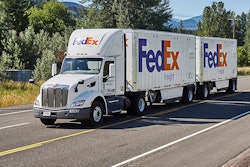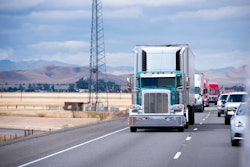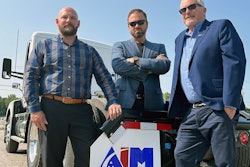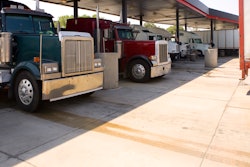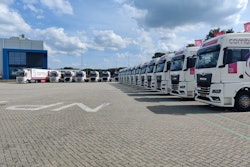Trucking news and briefs for Monday, Dec. 23, 2024:
Heightened cargo theft risk ahead during holidays
The combination of extended holiday closures, reduced staffing levels and stressed compliance resources over the next couple of weeks creates an environment ripe for cargo thieves.
Cargo theft recording firm CargoNet reported that cargo theft activity has already reached unprecedented levels across the U.S. this year, with reported incidents already 12% higher than 2023’s total.
Analysis of holiday-period theft data from the past five years reveals a concerning pattern that indicates heightened risk during the upcoming Christmas and New Year celebrations, the firm noted.
"The days immediately following Christmas have historically been the most active for cargo thieves," said Keith Lewis, Vice President of Operations at CargoNet "Our analysis of 261 theft events between December 23 and January 2 over the past five years shows December 27 and 29 as peak days for criminal activity, with 31 reported incidents each."
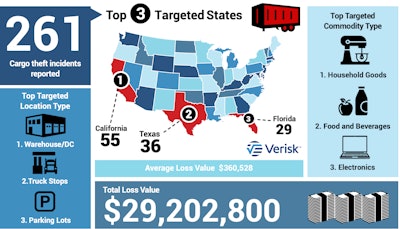 CargoNet has tracked 261 cargo theft incidents between Dec. 23 and Jan. 2 over the last 5 years worth more than $29 million.CargoNet
CargoNet has tracked 261 cargo theft incidents between Dec. 23 and Jan. 2 over the last 5 years worth more than $29 million.CargoNet
The increasing sophistication of cargo theft operations has contributed to a steady rise in holiday season incidents. The 2019-2021 holiday seasons averaged 43 events per year, before jumping to 59 in 2022 and reaching 73 in 2023. Current trends suggest that this upward trajectory will continue through the 2024 holiday period.
California, Texas, and Florida remain the most targeted states for cargo theft. At the county level, Shelby County, Tennessee leads, followed by Dallas County, Texas, and both San Bernardino and Los Angeles counties in California.
Thieves have shown particular interest in specific commodities. Vehicle accessories such as motor oil, auto parts, and tires top the list, followed by televisions and other display screens and alcoholic beverages.
While sophisticated fraud schemes are increasing, traditional theft methods -- including stolen trailers and full shipment theft -- continue to account for the majority of incidents.
The surge in criminal activity has been particularly dramatic in 2024. As of Dec. 18, reported incidents have already surpassed all of 2023 by several hundred incidents. The increase has been especially pronounced in key states, with Texas seeing a 36% rise and California experiencing a 21% increase in reported incidents.
[Related: Sneak peak: 2025 cybersecurity issues in trucking]
TSA credentialing bill heads to president’s desk
After passing in the U.S. Senate last month, the U.S. House this week passed the Transportation Security Screening Modernization Act, which once enacted, will streamline the credentialing process for certain Transportation Security Administration-managed programs, such as the Hazardous Materials Endorsement (HME) and the Transportation Worker Identification Credential (TWIC).
Once signed into law, the act will allow workers to apply existing valid background checks to multiple credentialing programs.
The language of the bill requires the administrator of the TSA to take action within two years of the bill being signed into law. The bill also requires that individuals applying for more than one TSA security threat assessment program at the same time to be charged a fee that is less than the cumulative fee that would otherwise be charged if applying for the programs separately.
The bill’s passage received immediate praise from the American Trucking Associations, which has for years been pushing for the legislation.
“For far too long, the truck drivers who keep our country running have been subjected to an outdated, inefficient credentialing system that does not respect their time and money,” said ATA President Chris Spear. “That begins to change today. By taking the final step needed to eliminate unnecessary bureaucratic hurdles, Congress will provide essential supply chain workers with overdue relief from redundant background checks and fees.”
Nikola set to open new hydrogen fueling station
Nikola Corporation, via its HYLA brand, announced Dec. 18 the securing of a new HYLA station located in West Sacramento, California. The station will be commercially operational in January 2025.
Featuring a compact high-pressure hydrogen refueler, the station at 917 Stillwater Rd. in West Sacramento represents the latest phase in Nikola's commitment to provide hydrogen refueling solutions for Class 8 trucks, the company said. This new station will increase Nikola's hydrogen presence in Northern California.
Phase one of the West Sacramento station will be capable of fueling up to 20 Nikola hydrogen fuel cell electric Class 8 trucks daily. HYLA will provide continuous site support, ensuring a seamless and efficient fueling experience for its customers.
"We are thrilled to open our first HYLA hydrogen refueling station in Northern California. West Sacramento marks a significant milestone for Nikola and offers convenient access for our fleet customers based in West Sacramento and its surrounding areas," said Nikola President of Energy Ole Hoefelmann. "Reaching a zero-emission future just became one step closer as we continue our planned rollout to strengthen the north-south I-5 freight corridor and expand coverage areas from the Port of Oakland."
Working alongside state and local jurisdictions, HYLA is securing a robust hydrogen supply chain and refueling infrastructure to support its growing fleet customer base. Nikola's expansion of its HYLA fueling network into West Sacramento will further accelerate the adoption of hydrogen fuel electric trucks across California, helping to further zero-emissions transportation efforts across the United States, the company added.
The HYLA refueling network will offer Nikola hydrogen fuel cell electric vehicles and other Class 8 customers flexible refueling options, including modular and permanent HYLA stations, customer-owned facilities, and partnerships with public truck stops.



